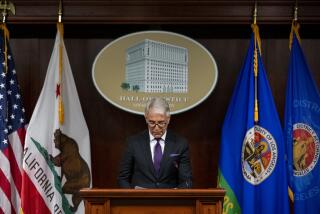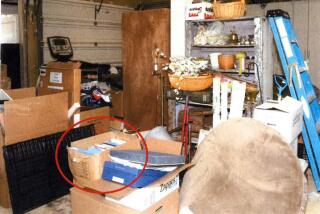LaRouche Lawyers Fight to Get FBI Files
- Share via
BOSTON — Attorneys for Lyndon H. LaRouche, six followers and five LaRouche political groups battled the government Tuesday for access to classified FBI information concerning LaRouche and key players in the Iran-Contra scandal.
Several of the defense lawyers sought to have the case dismissed after they were unable to obtain the information, but U.S. District Judge Robert E. Keeton delayed ruling on the requests until the question of access to the FBI files is resolved.
The defense, at hearings outside the presence of the jury, has presented evidence in recent weeks that the FBI had infiltrated LaRouche organizations.
The lawyers also pointed to a one-page memo from retired Air Force Maj. Gen. Richard V. Secord to Marine Lt. Col. Oliver L. North, the former National Security Council aide, in which Secord reported that “our man here claims Lewis has collected info against LaRouche.” Lewis was not further identified.
The memo, found in North’s safe after he was fired amid the Iran-Contra scandal, was surrendered to the LaRouche lawyers after the special prosecutor investigating the scandal acknowledged it.
Secord Can’t Remember
Secord, reached Tuesday in Washington, said he could not recall the memo and that he never crossed paths with LaRouche. Secord was one of North’s principal operatives in his network supplying aid to the Nicaraguan rebels.
The defense lawyers have said they will prove the Reagan Administration plotted to ruin LaRouche because he opposed Reagan’s programs for supporting the Contras. They also say the government has improperly withheld evidence that could prove their case, a point that could be grounds for dismissal of the charges.
They contend that North directed the FBI to get information against LaRouche and infiltrate his organizations as part of a larger FBI surveillance of opponents of the Administration’s policies on Central America.
LaRouche and the others are charged with conspiring to cover up credit card fraud allegedly committed by LaRouche supporters during his 1984 presidential campaign. Four of the organizations are charged with fraud. If convicted, LaRouche, who is running for the 1988 Democratic presidential nomination, could face five years in prison.
Prosecutors throughout the trial and pretrial hearings denied defense contentions that government agents had infiltrated LaRouche organizations and concocted a credit card fraud and cover-up scheme in order to destroy LaRouche politically.
After learning of the May, 1986, Secord-North memo, lawyer Michael Reilly requested access to any government-held information about LaRouche and Lewis that might be favorable to the defense.
The prosecutor in the case, Assistant U.S. Atty. John Markham, surrendered some FBI documents to Reilly, but the FBI later told Markham that he was not supposed to release the material.
Other defense attorneys now want copies of the documents, but the FBI opposed the request on grounds that the records are classified. Reilly, who represents just one of the five LaRouche organizations charged, has said he cannot give the documents to his fellow defense lawyers because of federal rules on classified information.
Markham, as the government attorney in the case, ordinarily would argue the FBI’s position, but he refused to do so Tuesday. He said there was a conflict of interest between the FBI’s stance and his role as prosecutor. He did not elaborate, but said the conflict would be resolved before the hearing today on access to the records.
Judge Keeton also told Markham he must explain why the defense lawyers had to use Freedom of Information Act requests to learn of thousands of other FBI documents mentioning LaRouche that were not turned over to the defense before the trial.
“I’ve got to have some explanation from the government about how the documents are discoverable through FOIA requests and not by the prosecution,” the judge said.
After the questions over access to the records are resolved, defense lawyers have said they will renew their motions for dismissal of the case or a mistrial, on grounds that their opening statements and cross-examination strategies would have been different if they had been able to review the documents before the trial.
More to Read
Sign up for Essential California
The most important California stories and recommendations in your inbox every morning.
You may occasionally receive promotional content from the Los Angeles Times.










